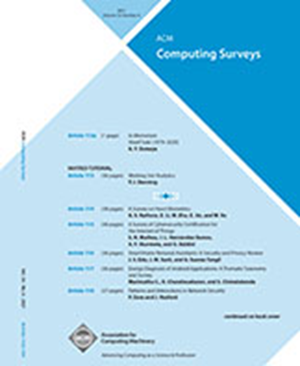Knowledge-based Cyber Physical Security at Smart Home: A Review
IF 23.8
1区 计算机科学
Q1 COMPUTER SCIENCE, THEORY & METHODS
引用次数: 0
Abstract
Smart-home systems represent the future of modern building infrastructure as they integrate numerous devices and applications to improve the overall quality of life. These systems establish connectivity among smart devices, leveraging network technologies and algorithmic controls to monitor and manage physical environments. However, ensuring robust security in smart homes, along with securing smart devices, presents a formidable challenge. A substantial number of security solutions for smart homes rely on data-driven approaches (e.g., machine/deep learning) to identify and mitigate potential threats. These approaches involve training models on extensive datasets, which distinguishes them from knowledge-driven methods. In this review, we examine the role of knowledge within smart homes, focusing on understanding and reasoning regarding various events and their utility towards securing smart homes. We propose a taxonomy to characterize the categorization of decision-making approaches. By specifying the most common vulnerabilities, attacks, and threats, we can analyze and assess the countermeasures against them. We also examine how smart homes have been evaluated in the reviewed literature. Furthermore, we explore the challenges inherent in smart homes and investigate existing solutions that aim to overcome these limitations. Finally, we examine the key gaps in smart-home-security research and define future research directions for knowledge-driven schemes.基于知识的智能家居网络物理安全:综述
智能家居系统代表着现代建筑基础设施的未来,因为这些系统集成了众多设备和应用程序,以提高整体生活质量。这些系统在智能设备之间建立连接,利用网络技术和算法控制来监控和管理物理环境。然而,如何确保智能家居的稳健安全,同时确保智能设备的安全,是一项艰巨的挑战。大量智能家居安全解决方案都依赖于数据驱动方法(如机器/深度学习)来识别和减轻潜在威胁。这些方法涉及在大量数据集上训练模型,这使它们有别于知识驱动型方法。在本综述中,我们将研究知识在智能家居中的作用,重点关注对各种事件的理解和推理,以及它们在确保智能家居安全方面的效用。我们提出了一种分类法,用于描述决策方法的分类特征。通过说明最常见的漏洞、攻击和威胁,我们可以分析和评估针对它们的对策。我们还研究了所查阅文献中对智能家居的评估方式。此外,我们还探讨了智能家居固有的挑战,并研究了旨在克服这些局限性的现有解决方案。最后,我们探讨了智能家居安全研究中的主要差距,并确定了知识驱动方案的未来研究方向。
本文章由计算机程序翻译,如有差异,请以英文原文为准。
求助全文
约1分钟内获得全文
求助全文
来源期刊

ACM Computing Surveys
工程技术-计算机:理论方法
CiteScore
33.20
自引率
0.60%
发文量
372
审稿时长
12 months
期刊介绍:
ACM Computing Surveys is an academic journal that focuses on publishing surveys and tutorials on various areas of computing research and practice. The journal aims to provide comprehensive and easily understandable articles that guide readers through the literature and help them understand topics outside their specialties. In terms of impact, CSUR has a high reputation with a 2022 Impact Factor of 16.6. It is ranked 3rd out of 111 journals in the field of Computer Science Theory & Methods.
ACM Computing Surveys is indexed and abstracted in various services, including AI2 Semantic Scholar, Baidu, Clarivate/ISI: JCR, CNKI, DeepDyve, DTU, EBSCO: EDS/HOST, and IET Inspec, among others.
 求助内容:
求助内容: 应助结果提醒方式:
应助结果提醒方式:


